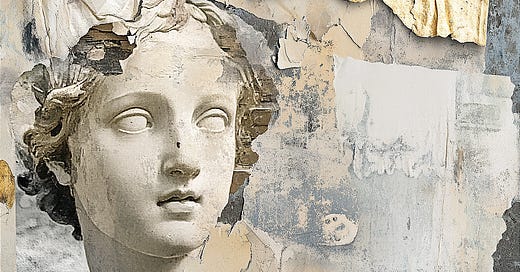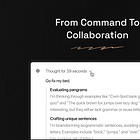The AI Teammate Hidden in Every Prompt
It turns out I'm not just building tools, I'm building a team.
Welcome to Unknown Arts, where creativity flows through new technology. Ready to forge ahead into the unknown? Join the journey!
🌄 Into the Unknown
Two weeks ago, I shared how using the persona pattern can dramatically improve your AI prompts. Then on Wednesday, I walked through the specific prompt I developed as my creative collaborator for concept ideation.
A funny thing happened along this journey: I realized I was no longer designing and building a tool. I was designing and instructing a teammate who was helping me design and build tools (very meta, I know...).
As a solo creator, I'm used to doing almost everything myself. I don't have a bunch of extra cash floating around to hire a traditional team to support me. But I've found that by treating AI as specialized teammates rather than just tools, I'm able to tackle work that would typically require multiple people. Each prompt has become less like a command and more like a job description – defining the expertise, approach, and outcomes I need from this digital colleague.
Just like working with real teammates, it requires clear communication, well-defined expectations, and constant refinement of processes. I'm still figuring this out, but the early results are promising enough that I wanted to share what I'm learning.
🧭 The Compass
The core skill for building an AI team is a new kind of delegation.
When you brief a designer or writer, you don't just say "make me a logo" or "write me an article." You provide context, examples, audience details, and desired outcomes (among other things). I'm learning that working with AI teammates requires the same level of clarity, but with its own unique approach.
Instead of giving commands, I create frameworks that guide toward specific outcomes. Here's what I mean:
Instead of "write me a blog post about X," I start with a conversation about my insights and turn the discussion into a draft
Instead of "analyze this data," I specify the patterns I'm curious about and how I plan to use the insights
Instead of "help me brainstorm," I define the constraints of the ideation session and set criteria for evaluating good ideas
It takes more upfront thought to communicate and write prompts this way. But I've found that investing in these "delegation skills" - learning to articulate context, define outcomes, and set clear parameters - is what transforms AI from a simple tool into a capable teammate. And as your team grows, these skills become even more crucial for coordinating multiple AI teammates toward larger goals.
🗝️ Artifact of the Week
A recent podcast between Yuval Noah Harari and Rich Roll got me thinking.
Harari described AI not as artificial intelligence, but as "alien intelligence" - emphasizing that it's not just a simulation of human thinking, but a unique, new form of reasoning. This distinction clicked with my experience: I'm not working with a fake version of a human teammate, but with a genuinely different kind of human-like intelligence.
While I'm excited about the immediate, practical benefits of scaling my work, I'm also aware that I'm participating in something bigger: integrating a new form of intelligence into the creative process. It's fascinating to see how this changes the way I think about collaboration and my own role on this new playing field.
📝 Field Note
Start with familiar territory: When building your AI team, begin with roles where you understand the work - where you know what excellence looks like.
My first AI teammate was a creative collaborator because I know what great creative collaboration feels like. I understand the back-and-forth flow of ideas, the right questions to ask, the ways to build on concepts. While I could do this work solo, having a thought partner amplifies what's possible for me.
This approach lets you evaluate the AI's output effectively and refine your delegation skills before venturing into less familiar territory. Think of it as training a brilliant new team member in the unique aspects of your process and working style.
🕵 Ready to Explore?
Here’s this week’s mission (should you choose to accept it):
Onboard Your First AI Teammate
This week, I challenge you to transform one of your regular AI prompts into a proper teammate. Here's how:
Choose Your First Role
Pick a task you do regularly and understand well
Think about what an ideal teammate would bring to this task
Write a Role Description
Define the expertise needed
Outline the working style you want
Specify how you'll measure success
Create Your Onboarding Prompt
Begin with: "You are my [role], here to help me with [specific task]..."
Include the context about your goals, necessary expertise, working style, and success measures
Set clear parameters for interaction
Test and Refine
Try a few test runs
Note what works and what doesn't
Adjust your prompt based on the results
Reflect
What changed when you treated AI as a teammate rather than a tool?
How might you apply this to other tasks?
Final Thoughts
Building an AI team isn't just about better prompts - it's about developing a new kind of leadership skill.
Start small, be patient with the process, and remember that like any team member, your AI colleagues will improve as you learn to work together more effectively.
Until next time,
Patrick
Help grow the Unknown Arts AI Knowledge Base
I’m curating a thoughtful collection of resources to promote the true creative power of AI. Browse the website or the Github repo, and if you have an AI resource that genuinely helped you, I’d love to hear about it.
Want to help Patrick out? Share this with a friend.






